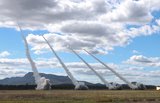Australia looks towards space with force restructure, investment and training
Australia is looking to improve its presence in space with a focus on communications and creating a dedicated segment of its defence forces committed to the domain.
Harris is to supply the Falcon III Secure Personal Radio (SPR) to an unnamed NATO country under an $11 million order received from that country’s Ministry of Defence, announced on 28 November. The order is tied to a new framework contract, similar to an IDIQ, with the potential to reach $20 million over the next year.
According to Harris, the country is acquiring the Harris RF-7800S SPR, advanced headsets and other accessories to provide high-performance voice, integrated hearing protection, wideband data and situational awareness capabilities at the team, squad and platoon levels. The equipment will enable soldiers to maintain voice communication in rapidly changing environments and situations, while seamlessly sharing data services and tracking the position of each team member.
The SPR is a core component of the Harris FalconFighter Soldier System. It is a lightweight, secure soldier radio platform that offers full-duplex voice, multiple talk-group capabilities and data rates up to 256 Kbps. The SPR allows simultaneous communication for voice, data and even video with unlimited listeners over a range of more than two km, ensuring reliable connectivity between team members and with command-level intelligence. The SPR provides continuous coverage in the 350 to 450 MHz frequency range, as well as high-speed USB connectivity to other C4 devices and provides real-time situational awareness with integrated GPS.
Brendan O’Connell, president, international business, Harris RF Communications, commented: ‘This soldier system programme provides important new communication capabilities at the soldier level. The Harris SPR provides the best performance and best overall solution for team-based communications, with maximum range and voice quality. The Harris SPR is a lightweight, secure soldier radio platform deployed to more than 50 nations. This radio has rapidly grown to become the international standard for voice and data communications to the individual soldier.’

Australia is looking to improve its presence in space with a focus on communications and creating a dedicated segment of its defence forces committed to the domain.

The Portuguese company’s naval communications system is in service across more than a dozen countries. It has turned to its home nation for support in developing a new vehicle based C2 system.

The Vision4ce Deep Embedded Feature Tracking (DEFT) technology software is designed to process video and images by blending traditional computer vision with artificial intelligence (AI) algorithms to present actionable information from complex environments.

Persistent Systems has been cleared by National Security Agency (NSA) to transmit sensitive data on commercial networks. The devices are added to the NSA’s Commercial Solutions for Classified (CSfC) component list which also includes other companies’ products providing the same security.

The release of the UK’s Strategic Defence Review (SDR) has been long promised as mid-year. It is possible it could be as early as 2 June although the UK Ministry of Defence (MoD) continues to play its cards close to its chest.

Intelsat outlines how its multi-orbit SATCOM architecture is enhancing connectivity and resilience for special operations forces operating in degraded and contested environments.